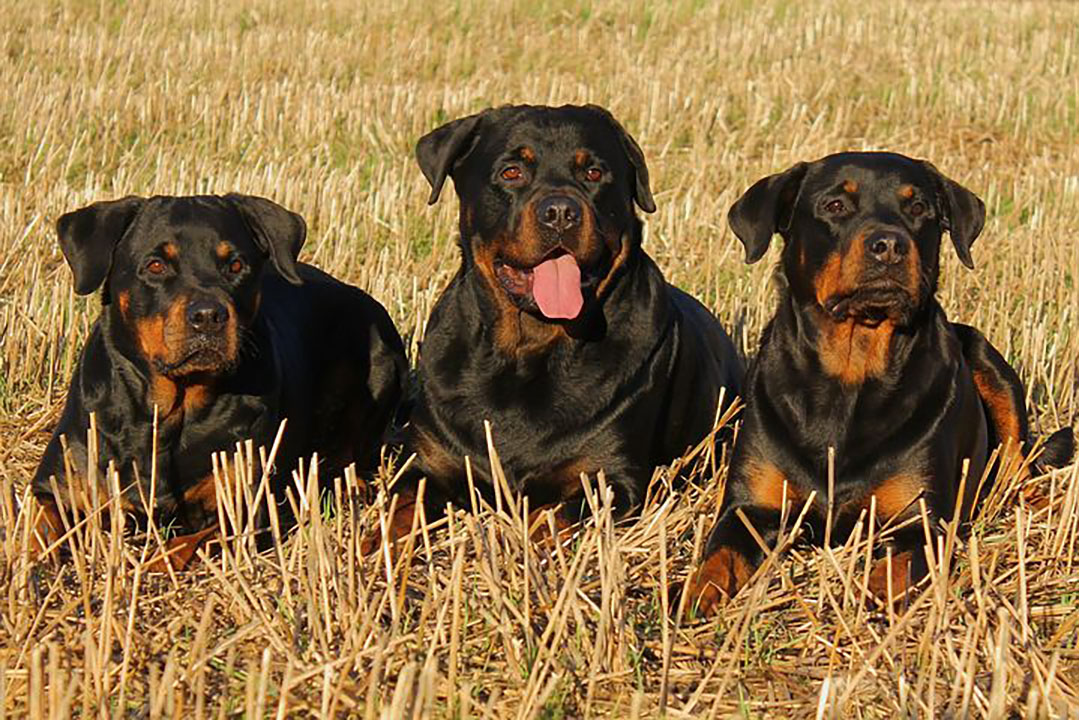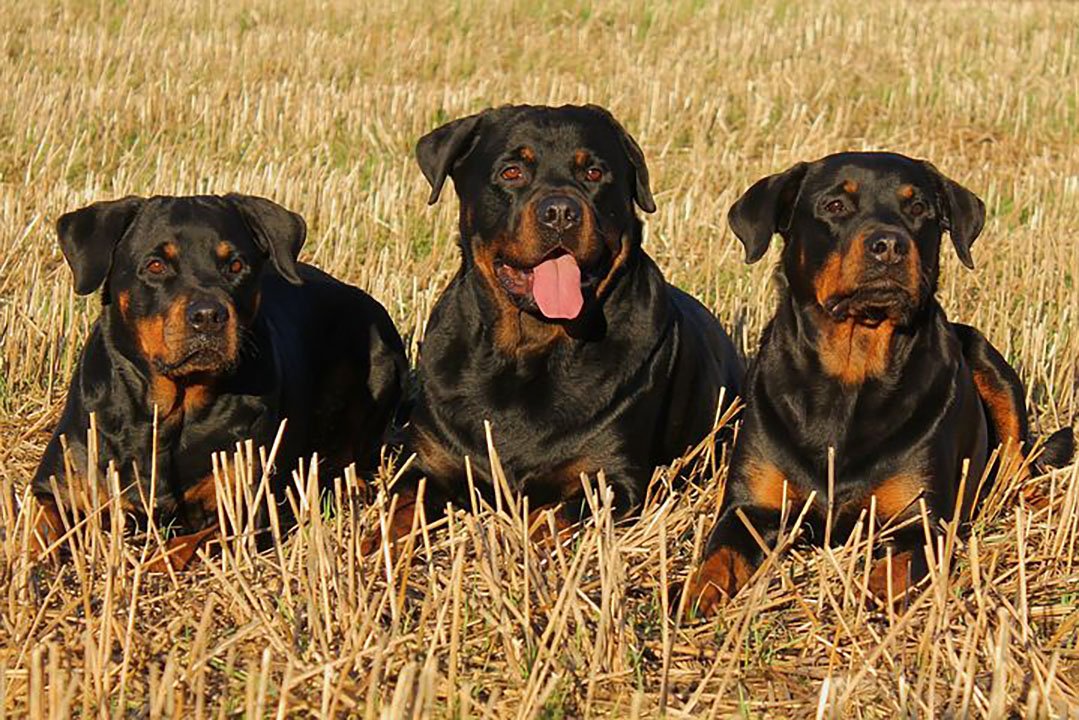When it comes to dogs, there’s one breed that often finds itself at the center of a heated debate: the Rottweiler. But have you ever wondered why Rottweilers have a bad reputation? Well, fear not! In this article, we’ll delve into the reasons behind the misconceptions surrounding these misunderstood pooches.
You see, the first thing you need to know is that Rottweilers haven’t always had a negative image. In fact, these loyal and intelligent creatures were once cherished as hardworking companions and trusted protectors. But over time, the media has played a significant role in perpetuating negative stereotypes about Rottweilers, amplifying their perceived aggression and danger.
Now, it’s important to acknowledge that no dog is inherently bad, including Rottweilers. Like any other dog breed, their behavior boils down to their upbringing, training, and individual personality. So, let’s go beyond the misconceptions and unravel why Rottweilers have been painted with such a broad brush in popular culture. Stay tuned!
Discovering the reason behind why Rottweilers have garnered a negative reputation can be intriguing. While certain factors have contributed to this perception, it’s important to debunk common misconceptions. Proper training and socialization play a crucial role in shaping a dog’s behavior, regardless of breed. Responsible ownership and education are key to challenging stereotypes and fostering a more positive image of Rottweilers, focusing on their loyal, protective, and loving nature.

Why Rottweilers Have a Bad Reputation?
Rottweilers are often portrayed as aggressive and dangerous dogs by the media and popular culture. This negative reputation can be traced back to a combination of factors, including their historical use as guard dogs, their physical appearance, and a few isolated incidents of aggression. However, it is important to remember that not all Rottweilers are aggressive, and they can make loyal and loving pets when properly trained and socialized.
The History of Rottweilers and Their Association with Aggression
Rottweilers have a long history that dates back to ancient Rome, where they were used as herding and guarding dogs. Their natural instincts to protect and defend their territory made them ideal guard dogs for cattle and other livestock. Over time, Rottweilers became popular as working dogs, assisting with tasks such as pulling carts and guarding homes.
Unfortunately, their reputation as guard dogs also led to their association with aggression. Some irresponsible owners began using Rottweilers for illegal activities, such as dog fighting, which further perpetuated the negative image of the breed. These incidents, coupled with media sensationalism, contributed to the unfair label of Rottweilers as inherently aggressive dogs.
However, it is crucial to understand that a dog’s behavior is influenced by various factors, including genetics, upbringing, training, and socialization. Responsible ownership and proper training play a key role in shaping a Rottweiler’s temperament and behavior.
The Impact of Media Portrayal on Rottweiler’s Reputation
The media has a significant influence on shaping public opinion, and they often sensationalize stories involving dog attacks, particularly when it comes to Rottweilers. It’s important to recognize that sensationalized media coverage can lead to a distorted perception of reality.
News outlets tend to focus on the “scary” or “dangerous” aspects of Rottweilers, which can perpetuate the negative stereotype. By highlighting isolated incidents and downplaying the responsible ownership and the positive traits of the breed, media coverage can create an unfair bias against Rottweilers.
It is essential to approach media coverage with critical thinking and consider the broader context when making judgments about a specific breed. Responsible reporting should provide a balanced view of the overall characteristics and behavior of Rottweilers, rather than focusing solely on the negative stories.
The Influence of Breed-Specific Legislation on Rottweilers
Breed-specific legislation (BSL) refers to laws and regulations that target specific dog breeds based on their appearance or breed type. Unfortunately, Rottweilers are among the breeds most commonly affected by BSL. This type of legislation often imposes strict regulations on ownership, such as mandatory muzzling, higher insurance fees, and even bans on owning certain breeds.
While the intention behind BSL may be to reduce dog-related incidents, it is important to note that this approach is controversial and not based on scientific evidence. Research has shown that breed-specific legislation is ineffective in reducing overall dog bites and emphasizes responsible ownership and education instead. BSL unfairly stigmatizes breeds like Rottweilers and can perpetuate the negative perception of these dogs.
Focusing on responsible ownership, including proper training, socialization, and education for all dog owners, regardless of breed, is the most effective way to promote public safety and prevent dog-related incidents.
The Importance of Responsible Ownership and Proper Training
Like any dog breed, Rottweilers require responsible ownership and proper training to become well-behaved members of society. Here are some key factors to consider when owning a Rottweiler:
Socialization:
Early and ongoing socialization is crucial for a Rottweiler’s development. Expose them to different environments, people, and other animals to help them become comfortable and well-adjusted.
Training:
Obedience training should start at an early age and focus on positive reinforcement techniques. Consistency, patience, and rewards help Rottweilers understand what is expected of them and reinforce positive behaviors.
Exercise:
Rottweilers are an active breed that requires regular physical exercise to stay mentally and physically stimulated. Provide them with ample opportunities to burn off energy through walks, playtime, and interactive toys.
Spaying/Neutering:
Spaying or neutering your Rottweiler can have various benefits, including reducing the risk of certain health issues and minimizing hormone-driven behaviors.
Responsible Breeding:
If considering getting a Rottweiler, opt for a responsible breeder who prioritizes the health and temperament of their dogs. A reputable breeder can provide well-socialized puppies with a solid genetic foundation.
Educating Others:
As a responsible Rottweiler owner, you can help debunk the stereotypes by educating others about the breed’s true nature. Engage in open and positive conversations about Rottweilers, emphasizing their loyalty, intelligence, and potential as loving family pets.
The Importance of Changing Perceptions
Changing the negative perception of Rottweilers requires collective effort from responsible owners, the media, and society as a whole. By focusing on education, responsible ownership, and debunking myths, we can create a more accurate and fair understanding of the breed.
It is crucial to judge dogs as individuals rather than making generalizations based on breed. Rottweilers, like any other breed, have the potential to be loving and well-mannered pets when raised in a nurturing and responsible environment.
With the right approach, we can shift the public perception of Rottweilers, allowing them to be seen for their true qualities and positive contributions as companion animals.
Why Do Rottweilers Have a Bad Reputation?
- Rottweilers sometimes display aggressive behavior due to poor training or mistreatment.
- Media often portrays Rottweilers as aggressive and dangerous dogs.
- Some people mistakenly believe that Rottweilers are inherently aggressive because of their size and strong appearance.
- Irresponsible ownership and breeding practices can contribute to the negative reputation of Rottweilers.
- Education and proper socialization can help to dispel misconceptions and improve the reputation of Rottweilers.
Frequently Asked Questions
Welcome to our FAQ section where we address common concerns about the reputation of Rottweilers. Despite some negativity surrounding this breed, it’s important to approach the topic with an open mind and understand the reasons behind their reputation. Below are five questions and answers that shed light on why Rottweilers may have a bad reputation.
1. Are Rottweilers naturally aggressive?
While Rottweilers can be protective and territorial, it is crucial to remember that aggression is not a natural trait of the breed. Like any dog, their behavior is heavily influenced by their upbringing, training, and environment. Responsible ownership, early socialization, and positive training methods are key to ensuring a well-rounded and friendly Rottweiler.
If a Rottweiler exhibits aggressive behavior, it is often a result of mistreatment, neglect, or lack of proper training. It’s unfair to label the entire breed based on the actions of a few individuals. With responsible ownership, Rottweilers can be loving, loyal, and gentle companions.
2. Why do Rottweilers sometimes make headlines for attacks?
Instances of Rottweilers being involved in attacks or incidents are typically amplified by media coverage, which tends to focus on negative events. It’s vital to keep in mind that the behavior of any dog, including Rottweilers, is influenced by a variety of factors such as socialization, training, and individual temperament.
Additionally, some people may train or exploit Rottweilers to exhibit aggressive behavior for illegal purposes, which can contribute to negative incidents involving the breed. Placing the blame solely on the breed overlooks the responsibility of owners and the influence of external factors.
3. Are Rottweilers good with children?
Rottweilers can be excellent companions for children when properly socialized, trained, and supervised. They have a reputation for being protective and gentle with their family members, including children. However, no dog should be left unsupervised with young children, regardless of breed.
Introducing a Rottweiler to children at a young age, along with providing ongoing positive socialization experiences, helps solidify a strong bond between them. As with any dog, it’s crucial to set clear boundaries, teach children how to interact respectfully with pets, and establish a safe and harmonious environment for both the dog and the child.
4. Can Rottweilers be rehabilitated if they have aggressive tendencies?
With proper rehabilitation and dedicated training, Rottweilers with aggressive tendencies can certainly improve their behavior. Working with a professional dog trainer or behaviorist experienced in positive reinforcement techniques is essential.
The key to rehabilitating an aggressive Rottweiler lies in identifying the root cause of their aggression and implementing appropriate training methods to address it. It requires time, patience, consistency, and careful management of their environment. By giving them the right support, it is possible to help Rottweilers overcome their aggressive tendencies and foster a more balanced temperament.
5. How can we help improve the reputation of Rottweilers?
Improving the reputation of Rottweilers starts with responsible ownership and education. By promoting positive experiences and responsible dog ownership principles, we can challenge the stereotypes and misconceptions surrounding this breed.
Encouraging proper socialization, training, and responsible breeding practices are key steps toward improving the reputation of Rottweilers. It’s also crucial to support organizations that work towards responsible dog ownership education and advocate for breed-neutral legislation that focuses on holding owners accountable for their dogs’ behavior rather than targeting specific breeds.
Summary
So why do Rottweilers have a bad rep? Well, it’s not really their fault. A few bad owners and media portrayals have unfairly labeled them as aggressive. But in reality, Rottweilers can be gentle, loyal, and loving companions, just like any other breed. It’s important to remember that a dog’s behavior is shaped by its environment and the way it’s raised and trained. With proper care, socialization, and responsible ownership, Rottweilers can show their true nature and break free from their undeserved bad reputation.
In conclusion, don’t judge a book by its cover, or in this case, a dog by its breed. Rottweilers have been misunderstood, but they have the potential to be wonderful pets if given the chance. Let’s focus on educating people about responsible dog ownership instead of perpetuating stereotypes. With a little understanding, Rottweilers can overcome their bad reputation and thrive as loving family pets.
